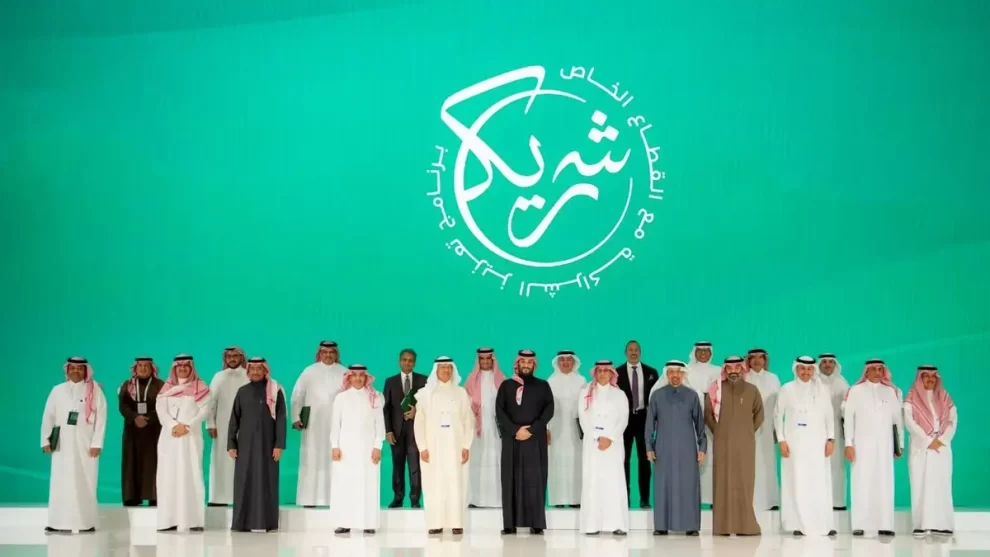From agreeing to reinstate diplomatic ties with long-time foe Iran, to smoothing relations with Syria, Saudi Arabia has taken the lead in igniting positive relationship changes and bringing peace to a region on edge.
As Saudi Arabia furthers its presence on the international stage with diplomacy and rapprochement as central pillars to a refined foreign policy standard, Al Arabiya English looks back at some of the recent significant economic and political developments.
Saudi-Iran relations
In a deal brokered by China, Saudi Arabia and Iran agreed to reestablish diplomatic relations in March.
The Kingdom and other Gulf countries, including the UAE, severed ties with Iran in 2016 following an attack by supporters of the Iranian regime on Saudi Arabia’s embassy in Tehran and consulate in Mashhad.
Under the new deal, the two countries have committed to reopening their embassies and missions in June and implementing security and economic cooperation agreements signed over 20 years ago.
However, Saudi Arabia’s Minister of Foreign Affairs Prince Faisal bin Farhan stressed that the thaw does not translate to “resolving all the differences between the two countries.”
Syria in Arab League
Saudi Arabia’s foreign minister met with Syrian President Bashar al-Assad in Damascus on April 18.
Prince Faisal’s visit came days after Syrian Foreign Minister Faisal Mekdad visited the Kingdom on the first such trip since the deadly Syrian civil war broke out in 2011.
Foreign ministers of the Gulf Cooperation Council, Egypt, Jordan and Iraq held a summit in Jeddah on April 14 to discuss Syria’s possible return to the Arab League.
Formal conversations between Syria and Gulf diplomats peaked after deadly quakes struck Syria, killing at least 6,000. Saudi Arabia and the UAE were among the countries to set up an air bridge and provide shelter and medical care.
Citing a source in the Saudi foreign ministry, Saudi state TV reported in late March that Saudi Arabia and Syria are in talks to resume consular services.
Qatar, Bahrain ties
Qatar and Bahrain announced on April 12 that they would resume diplomatic relations, two years after an Arab boycott of Doha was lifted.
The Kingdom led the efforts to rebuild ties with Qatar.
Saudi Arabia, the UAE, Bahrain and Egypt in January 2021 ended a three-and-a-half-year embargo on Qatar, and all but Bahrain restored travel and trade links in 2021.
Peace in Yemen
The war in Yemen, which started in 2014, has been a battlefield where the Arab Coalition, comprising of Gulf states including Saudi Arabia, backed the internationally recognized Yemeni government and fought against the Iran-backed Houthis.
A Saudi-Omani delegation, led by the Kingdom’s ambassador to Yemen Mohammed al-Jaber, visited Sanaa on April 10 as part of a flurry of diplomatic activity to end the conflict.
During this near-decade-long streak of fighting, various fighters from both sides were imprisoned.
Backed by discussions between Riyadh and Sanaa, mediated by Oman and in alignment with the UN, the two countries conducted a massive prisoner exchange.
At least 900 prisoners have been exchanged since April 17, the biggest since 2020, with Saudi Arabia and Yemen signaling an openness to continue discussions and find a means to end the civil war.
Special economic zones
Saudi Arabia’s Crown Prince Mohammed bin Salman launched on April 14 four new special economic zones in the Kingdom to attract more foreign investment in place of relaxed economic rules.
Companies operating within these zones can expect several benefits, including competitive corporate tax rates, exemption from customs duties on imports, production inputs, machinery and raw materials, and flexibility to hire global talent.
Foreigners will also be able to claim 100 percent ownership of their companies in the four economic zones in Riyadh, Jazan, Ras al-Khair and King Abdullah Economic City.
Fighting in Sudan
Forces loyal to Sudan’s top two generals engaged in heavy fighting on April 15, triggering what the United Nations has described as a humanitarian catastrophe, including the near collapse of the health system.
The fighting between the army and the paramilitary Rapid Support Forces killed at least 185 people nationwide.
Saudi Arabia and the UAE were among the first Gulf countries to call for dialogue over conflict.
The foreign ministers of Saudi Arabia, the UAE and the US held a phone call on April 15 to discuss the ongoing situation in Sudan, calling for a halt to military escalation and a return to a framework agreement between civilian political forces and the military.
The Arab League convened on April 16, called for by Saudi Arabia and Egypt, and discussed the evolving situation. The group also called for a ceasefire.
Additionally, Saudi Arabia’s foreign minister Prince Faisal bin Farhan made two phone calls on April 16 with Sudan’s Abdel Fattah al-Burhan and Rapid Support Forces Commander Mohamed Hamdan Dagalo, reaffirming the Kingdom’s call for calm, and stopping the military escalation.
It has been the first flareup of violence between the two sides since they joined forces to oust former leader Omar al-Bashir in 2019.
A disagreement over integrating the RSF into the military as part of the transition towards civilian rule sparked the fighting between both sides.
Hamas officials in Mecca
A Hamas delegation performed Umrah on April 18, in the Palestinian militant group officials’ first visit to the Kingdom since 2015.
Videos on social media showed leaders Ismail Haniyeh and Khaled Meshaal performing the Umrah pilgrimage.
This recent visit coincides with Palestinian President Mahmoud Abbas’s visit to the Kingdom.
Abbas met with Saudi Arabia’s Crown Prince Mohammed bin Salman on April 18 to discuss recent developments of the Palestinian-Israeli conflict.
Israeli-Palestinian conflict
Saudi Arabia denounced the recent storming of the al-Aqsa mosque compound and rejected practices “that undermine peace efforts and contradict international principles in respect of religious sanctities.”
Israeli police raided the al-Aqsa Mosque compound in Jerusalem on April 5, one of two times in the latest spat of violence that followed, triggering rocket attacks on Israel from Gaza, Lebanon and Syria that were met with Israeli strikes.
Booming economy, low unemployment
Saudi Arabia’s economy has been growing consistently in the last few years, confirmed by numerous standards set by national and international bodies.
Fitch Ratings raised Saudi Arabia’s sovereign debt rating to A+ in April and cited the country’s efforts to diversify its economy away from a reliance on oil sales and large reserves.
The Kingdom recorded its first budget surplus in almost a decade in 2022 and is forecasting another surplus this year, helped by high oil prices and rapid growth in the non-oil sector.
Aligned with the move towards a non-oil economy, Saudi Arabia launched Riyadh Air. The new airline ordered 121 Boeing 787 Dreamliner aircraft worth $37 billion. Riyadh Air and the expanded SAUDIA, the current flag carrier, are part of the Saudi strategy to diversify its economy, lead new key sectors, and become a global hub for transportation, tourism, cargo and logistics. Riyadh Air is expected to contribute $20 billion in non-oil GDP and create over 200,000 jobs in Saudi Arabia.
Early in March, Saudi Arabia announced it would invest $51 billion across eight companies as part of the Shareek program – designed to support large companies in helping the Kingdom’s economy achieve a target GDP growth by 2030.
In late April, the General Authority for Statistics (GASTAT) in the Kingdom revealed that Saudi Arabia’s unemployment rate dropped by four percent in Q4 of 2022, mainly driven by the large influx of Saudi women joining the workforce.
The total unemployment rate among Saudi citizens decreased to eight percent in Q4 of 2022, down from 9.9 percent in the previous quarter. The unemployment rate of Saudi men dropped from 4.3 percent in the previous quarter to 4.2 percent.
Saudi Arabia in SCO
Saudi Arabia’s King Salman bin Abdulaziz approved a Memorandum of Understanding (MoU) that granted the Kingdom the status of a dialogue partner in the Shanghai Cooperation Organization (SCO) on March 28.
The Shanghai Cooperation Organization is a Eurasian political, economic, international security and defense organization. It includes India, Kazakhstan, Kyrgyzstan, Russia, Tajikistan, Pakistan, and Uzbekistan, with Iran set to join soon.
Saudi Arabia and China have made significant efforts to develop their joint relations.
Saudi Arabia in space
On May 8, Saudi Arabia will make history when it sends its first-ever astronauts to ISS – including the first Arab female in space.
The Saudi Space Commission unveiled the official logo of the Kingdom’s scientific mission to the International Space Station (ISS) on April 18.
The logo – which will be placed on the official uniform of the crew – is a circular shape and features the Kingdom’s flag, representing the identity of the Saudi astronauts and reflecting the Kingdom’s heritage, history, cultural specificity, and traditions.
While 263 people from 20 countries have visited the ISS, Saudi Arabia will become only the sixth nation to have two national astronauts simultaneously working aboard the orbiting laboratory.
OPEC+ production cut
Saudi Arabia and other OPEC+ oil producers announced voluntary cuts to their production on April 2. Riyadh said it would cut output by 500,000 barrels per day (bpd) from May until the end of 2023.
The Saudi energy ministry said in a statement that the Kingdom’s voluntary cut was a precautionary measure to support the stability of the oil market.
It followed another significant cut in November 2022. With oil prices weakening then, OPEC+ members reduced the output target by 2 million bpd.
World leaders, diplomats visit Saudi Arabia
In the last two months, Saudi Arabia’s Crown Prince and top diplomats held high-level meetings with officials from the US, Iran, Netherlands, Egypt, and China. These meetings helped grow ties, demarcate the Kingdom’s diplomatic position in the Arab world, and cement Riyadh’s position internationally as a powerhouse in the Middle East.
On April 18, US Republican Senator Lindsey Graham met with Crown Prince Mohammed bin Salman and other senior Saudi leaders. Previously having made comments against Saudi Arabia in 2018 and his declaration of never visiting the Kingdom or doing business with it, Graham is now calling on his peers to visit the Gulf country and experience the changes for themselves.
The senator said he “changed course” after witnessing “things happening here that I didn’t think were possible.”
On April 13, Saudi Foreign Minister Prince Faisal bin Farhan met with two senior Biden administration officials in Jeddah – with US National Security Council coordinator for the Middle East and North Africa Brett McGurk and Special Presidential Coordinator Amos Hochstein. It came two days after US National Security Advisor Jake Sullivan spoke to the Crown Prince.
Crown Prince Mohammed bin Salman also met with Egyptian President Abdel Fattah al-Sisi on April 3 to review ties and discuss regional developments.
On April 13, Prince Faisal discussed the Russian-Ukraine war and several regional issues in a meeting with his Dutch counterpart Wopke Hoekstra who was visiting Jeddah on an official visit.
Early in April, after Saudi Arabia and Iran agreed to restore ties, the Saudi Foreign Minister discussed relations between the Kingdom and China during a meeting with his Chinese counterpart in Beijing.
Also in April, the head of the Central Intelligence Agency (CIA) Bill Burns was in Saudi Arabia to meet with officials and reinforce Washington’s commitment to intelligence cooperation. Ties between the US and Saudi Arabia have been turbulent over the last two years, particularly following President Biden’s pledge to make the Gulf country “a pariah.”
The CIA director’s quiet trip came on the heels of the surprising agreement signed between Riyadh and Tehran, brokered by China.
Source: Al Arabiya News































